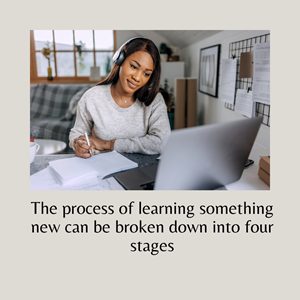Learning and implementing a new skill is easy!
Just kidding.
 In fact, it’s such a challenge for so many of us that trying to teach others how to stay the course pays off – literally. Just look at self-improvement. It has grown into a $13 billion industry.
In fact, it’s such a challenge for so many of us that trying to teach others how to stay the course pays off – literally. Just look at self-improvement. It has grown into a $13 billion industry.
When it comes to the nitty-gritty of learning something new, perhaps you’ve experienced something similar to this. Let’s use a desire to learn to play an instrument as an example.
It can’t be that hard, right?
You buy a guitar on Amazon.
Your guitar arrives, and you don’t even use scissors to undo the packing tape. You’re so excited, you just rip and tear, freeing your new acoustic instrument from its well-wrapped prison.
You hold it.
Look at it.
Tentatively swipe your fingers across the strings – it sounds horrible. Totally out of tune.
You recoil, and immediately realize there’s a lot more to this than you initially thought.
You pick it up again, watch a few YouTube videos on guitar and try to keep up. That lasts a week.
You lean the guitar up against a wall in your living room, behind your fiddle leaf fig.
Like clockwork, every time you water the plant, you see it. I should pick up the guitar again, you think.
Then before you know it, three years have passed. Have you picked up the guitar?
Nope.
What’s going on?
Learning a New Skill: The Four Stages of Competence
 The human brain is lazy. Or can be, at least. Many of us have a long list of time-consuming priorities, and our energy is limited. Our brain is frugal when it comes to spending energy – preferring to exert as little as possible. This can make it pretty disheartening to realize the new skill involves a lot more effort and fortitude than initially expected.
The human brain is lazy. Or can be, at least. Many of us have a long list of time-consuming priorities, and our energy is limited. Our brain is frugal when it comes to spending energy – preferring to exert as little as possible. This can make it pretty disheartening to realize the new skill involves a lot more effort and fortitude than initially expected.
The process of learning something new can be broken down into four stages, aptly named The Four Stages of Competence. This model is believed to have emerged in the 1960s, pioneered by a man named Martin Broadwell. Similar to Maslow, he portrayed the stages as a pyramid, emphasizing the hierarchy. We’ll look at each, from bottom to top.
Stage 1: Unconscious Incompetence:
At this stage, people do not know how to do the thing. Oftentimes, they may even minimize the level of skill or energy it requires to learn or do. People at this stage tend to be totally unaware of their lack of proficiency.
Stage 2: Conscious Incompetence:
This is the stage where people become aware of their deficit and the amount of time that learning is going to require. This is where mistakes are made – where people begin to comprehend the length of the journey ahead and what the undertaking will actually entail.
Stage 3: Conscious Competence:
Through effort and concentration, people at this stage are able to execute some of what they hope to accomplish. Yet, it still takes a lot out of them; there’s a lot of conscious effort and will involved.
Stage 4: Unconscious Competence:
At this stage, the bulk of the skill is mastered. The individual can zone out, and still perform at a high level. If they wish, people who have achieved this level of mastery are competent enough to teach the skill to other
Learning a New Skill: At Which Stage Do You Tend to Quit?
Take a moment to reflect on things you wanted to do in the past, and then gave up on.
Where in the four stages did that happen?
Hint: If you’re like most people, you give up during the second or third stage.
Trying to implement a new habit or skill is difficult. There are many things that hold us back or drive us to do things that look like self-sabotage. These things exert tremendous influence over our decision making, and consequently our lives. It can be extremely challenging when these things are unconscious – exist beneath our level of awareness – yet are essentially running our lives.
For people who feel like there’s extra resistance, or are sick of giving up on their efforts to better themselves and their lives, therapy can help.
 Be it reconciling limiting beliefs, fear of failure, the way we restrict what we “allow” ourselves to do in an effort to keep us safe… The list of ways we hold ourselves back can feel endless.
Be it reconciling limiting beliefs, fear of failure, the way we restrict what we “allow” ourselves to do in an effort to keep us safe… The list of ways we hold ourselves back can feel endless.
At the Relationship Therapy Center, our goal is to reconnect you with you.
Whatever it takes. We provide therapy in Fair Oaks, and Roseville – two convenient Northern California locations. We help people resolve their inner conflicts, learn to forgive themselves, and reestablish trust in their relationship to themselves. If you’re tired of all the inner resistance and are ready for change, give us a call.
Therapy in Roseville, CA, Fair Oaks, CA, or Online in California:
If you are ready to change your life for the better, we can help. To begin therapy at our Sacramento area locations or online, follow these steps:
- Contact the Relationship Therapy Center and schedule a free 20-minute phone consultation to learn more.
- Meet with one of our talented therapists
Services Offered at The Relationship Therapy Center in California:
Our Sacramento area counseling clinics located in Roseville and Fair Oaks, CA are pleased to offer a variety of mental health services. Our couples services include: Couples Counseling, Counseling after infidelity, sex therapy, co-parent counseling, family therapy, divorce counseling, intensive couples retreats, and premarital counseling. Our individual therapy services include, anxiety treatment, therapy for children, teen therapy, depression treatment, and individual relationship counseling. Our therapists offer online counseling in California to treat a variety of mental health concerns. Please reach out to our Sacramento area therapy office to learn more about the many ways we can help you or your loved ones.
